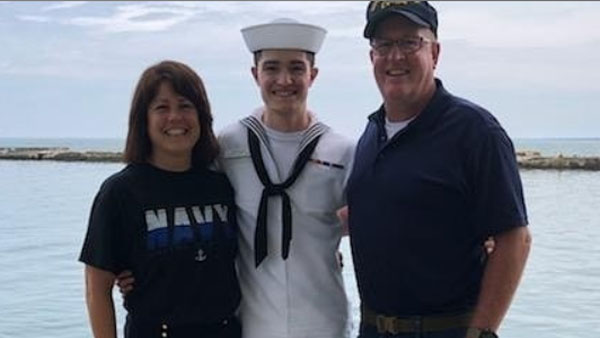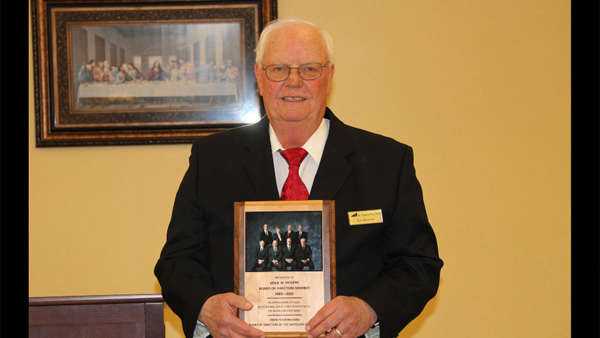Seaman Recruit Grant Novinger, Division 934, graduated as the top Sailor from Recruit Training Command on June 28.

Instagram photo (@gbnovinger).
(Great Lakes, Ill.) - Seaman Recruit Grant Novinger, Division 934, graduated as the top Sailor from Recruit Training Command, earning the Military Excellence Award on June 28.
Novinger, from Milan, Indiana, said he joined the Navy to continue his family’s tradition of service.
“My grandfather, Fred Novinger, and my father, Scott Novinger, served in the Navy,” Novinger said. “My brother, Koen Novinger, currently serves, and now I am. It just seemed like it’d be the right fit and that I would enjoy my experiences.”
Novinger, 18, was home-schooled and graduated in 2018. He was a member of the U.S. Naval Sea Cadet Corps for seven years, holding the rank of Midshipmen with the Flying Tigers Squadron, based in Milan, Indiana. He served in a number of roles, including color guard commander, cadet division commander and Chief Petty Officer.
Novinger is assigned the rate of Machinist’s Mate (Nuclear).
The Navy Club of the United States Military Excellence Award (MEA) is the top award presented to the No. 1 recruit of their graduating training group. The MEA is awarded to the recruit that best exemplifies the qualities of enthusiasm, devotion to duty, military bearing and teamwork. The award placed him at the pinnacle of today’s newest Sailors. Novinger is awarded a flag letter of commendation.
Novinger said he is honored to be selected for the MEA.
“This award means that I put my best foot forward when it comes to performing in boot camp,” he said. “It means that I have exemplified, to the best of my ability, the core values of honor, course, and commitment.”
Novinger credited his Recruit Division Commanders, Senior Chief Sonar Technician Joseph Meadors, Chief Logistics Specialist Tecla Blackett, and Aviation Structural Mechanic (Equipment) 1st Class Ryan O’Neill for their leadership and guidance.
Novinger said his parents, Scott and Michelle Novinger, who instilled a strong foundation and prepared him for his future, inspired him.
“My father and mother always pushed me to be the best that I can be in all circumstances,” Novinger said. “They have shown me that whatever I put into what I do is what I’ll get out of it. They were strict but very reasonable parents and for that, I am grateful.”
Novinger said the toughest part of boot camp was learning to be patient.
“That was probably the biggest challenge for me,” he said. “I was getting frustrated with other shipmates not always being on the go, etc. I overcame it by using a technique my RDCs taught me. It is called recalibrating, and it helped me to become more patient.”
After graduation, Novinger will attend Nuclear Machinist’s Mate “A” School in Charleston, South Carolina. He will then go to Nuclear Propulsion School and finally Prototype School. Machinist Mate duties in nuclear propulsion plants include operating reactor control, propulsion and power generation systems. Novinger will be able to choose between serving on an aircraft carrier and volunteering for submarine duty.
Boot camp is approximately eight weeks and all enlistees into the U.S. Navy begin their careers at the command. Training includes physical fitness, seamanship, firearms, firefighting and shipboard damage control along with lessons in Navy heritage and core values, teamwork and discipline. More than 35,000 recruits are trained annually at RTC and begin their Navy careers.

 Superintendent Writes Letter Regarding Manchester Elementary School Closing
Superintendent Writes Letter Regarding Manchester Elementary School Closing
 Napoleon State Bank Announces Retirement of Former President, Board Member
Napoleon State Bank Announces Retirement of Former President, Board Member
 Indy Woman Identified as Victim of Fatal Crash on State Road 56
Indy Woman Identified as Victim of Fatal Crash on State Road 56
 New Patient Care Manager Named at Our Hospice of Jennings County
New Patient Care Manager Named at Our Hospice of Jennings County
 Arrest Made in Green Township Road Rage Incident
Arrest Made in Green Township Road Rage Incident
 Ripley Co. Highway Dept. Urges Motorists to Watch Out for Mowing Crews
Ripley Co. Highway Dept. Urges Motorists to Watch Out for Mowing Crews










